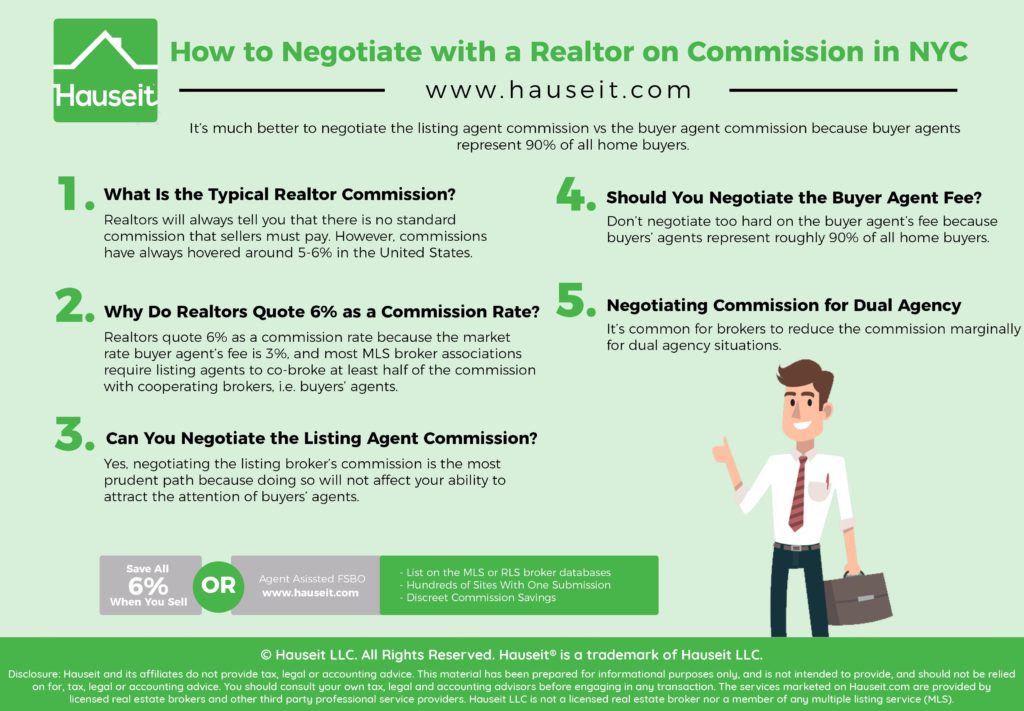It’s much better to negotiate the listing agent commission vs the buyer agent commission because buyer agents represent 90% of all home buyers, which means you’ll want their full attention if you want your home to sell.
It’s easier to convince a listing agent to take a haircut on their commission because of ancillary benefits from having a listing, such as enhanced branding and additional referral opportunities.
Table of Contents:

Realtors will always tell you that there is no standard commission that sellers must pay; however, in practice real estate commissions have always hovered around 5-6% in the United States.
Average commission rates are no different if you’re selling in high priced metropolitan centers like New York City or the San Francisco Bay area.
This means even though the average home in NYC sells $2,000,000 which is ten times the national average, Realtors in NYC simply make ten times more money than their cousins out in the country.
Get a 2% Rebate When You Buy
Save thousands on your home purchase with a buyer agent commission rebate from Hauseit
Realtors quote 6% as a commission rate because the market rate buyer agent’s fee is 3%, and most MLS broker associations require listing agents to co-broke at least half of the commission with cooperating brokers, i.e. buyers’ agents.
Note that we said at least half vs exactly half. While rules will vary by the MLS system and local Realtor association that operates it, most MLS broker databases will be okay with the listing broker co-broking at least half the total commission.
Some MLS broker databases may even be okay with any amount of co-broking, as long as it’s not zero.
Other MLS systems could conceivable be much more strict and require exactly equal co-broking.
This latter approach, if allowed, can make it very hard for discount real estate brokers to operate as we’ll explain in the next section.
Save 2% On Your Home Purchase
Save thousands on your home purchase with a buyer agent commission rebate from Hauseit
Yes, negotiating the listing broker’s commission is the most prudent path because doing so will not affect your ability to attract the attention of buyers’ agents.
The listing broker; however, may be open to taking a reduction in their fee as there are ancillary benefits from having an exclusive listing.
For example, an exclusive listing gives a broker additional branding and referral opportunities, perhaps even from neighbors who contact them to sell their properties after seeing the listing.
A listing can also be useful from a recruitment perspective
Having more listings gives the appearance of having more going on, and that can be useful from a recruiting perspective.
Lastly, a listing broker may be able to make additional commission by representing direct buyers who have inquired on your listing, either on your property or on another property listed on the MLS.
After all, only one buyer will end up buying your property, which means every other direct buyer who inquired on the listing is a potential client on something else.
Don’t negotiate too hard on the buyer agent’s fee because buyers’ agents represent roughly 90% of all home buyers.
Since it’s critical to attract the attention and cooperation of buyers’ agents, it’s not a good idea to offer too low of a commission on the MLS to them.
If you have a property worth more than roughly $1,000,000 then you can consider co-broking only 2.5% to buyers’ agents.
However, if you have a property worth substantially less than $1 million, you should consider sticking with a full 3% co-broke to buyers’ agents to attract their full attention.
From our partner brokers’ experience, sellers won’t get complaints from buyers’ agents at a 2.5% co-broke.
However, once you start offering 2% or less on the MLS to cooperating brokers, you’ll start receiving both verbal and written complaints.
Many buyers’ agents will outright refuse to show your listing at those levels and aren’t afraid to put that in writing.
A Full Service Listing for 1%
Sell your home with a traditional full service listing for just one percent commission.
Even though many of the larger franchises may not approve of any haircuts in commission, you may get lucky and have some of them agree to reduce the commission marginally for dual agency situations.
Dual agency simply means the listing agent will get to represent both the buyer and the seller, and as a result will be able to collect both sides of the commission.
This happens when the buyer does not have their own agent and is not aware that they can earn some of the buyer agent fee for themselves through a buyer agent commission rebate.
Unfortunately for most home sellers, the most they’ll be able to negotiate from the larger franchises will be 1% off for a direct buyer, dual agency situation.
That means the seller will still pay 6% in commission normally, but only 5% if the buyer doesn’t have their own agent.
Disclosure: Commissions are not set by law or any Realtor® association or MLS and are fully negotiable. No representation, guarantee or warranty of any kind is made regarding the completeness or accuracy of information provided. Square footage numbers are only estimates and should be independently verified. No legal, tax, financial or accounting advice provided.






